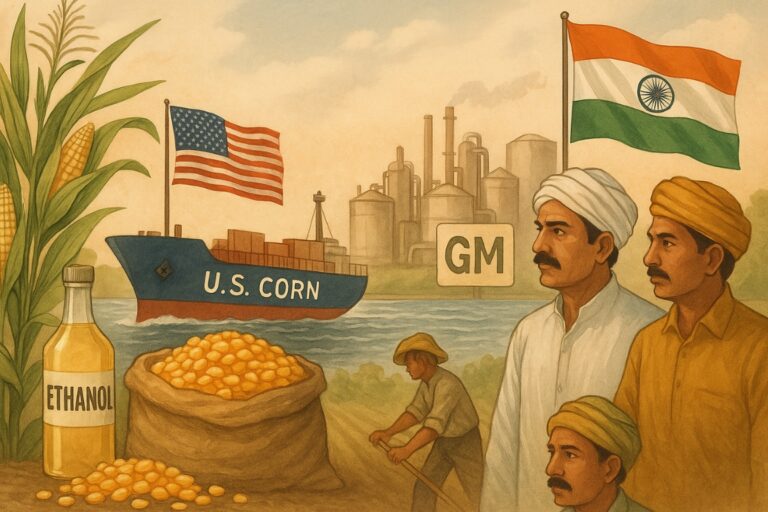The U.S. has been pressing India to allow imports of American corn. India, however, is resisting the move due to concerns over genetically modified (GM) crops, protection of farmers, and the objectives of its ethanol blending programme.
Corn and Ethanol in India
- India produces about 50 million tonnes of maize annually.
- Traditionally used for poultry feed, livestock feed, and human consumption.
- With the ethanol blending target of 20% by 2025, demand for maize as a feedstock has sharply risen.
- Around 10–12 million tonnes of maize are expected to go into ethanol production this year.

Does India Import Corn?
- India has largely been self-sufficient in maize production, sometimes even exporting.
- Recently, imports rose to about 1 million tonnes in 2024–25, mostly from Myanmar (60%) and Ukraine.
- Imports are largely to support ethanol blending, but India avoids buying U.S. corn as it is genetically modified (GM).
Why India Avoids U.S. Corn
- GM Concerns: India has only approved GM cotton for cultivation. GM brinjal and mustard remain under review. Importing GM corn may cause food safety and political concerns.
- Ethanol Policy Purpose: Ethanol blending aims at reducing oil imports, saving foreign exchange, and supporting Indian farmers.
- Farmer Protection: Cheap U.S. corn costs about 70% of Indian maize prices (excluding transport costs). This could disrupt India’s growing maize ecosystem and hurt farmers, especially in states like Bihar.
U.S. Pressure and its Motives
- The U.S. has high maize yields (3 times India’s) and surplus production.
- Corn and soybeans are politically important in the U.S. Midwest (Republican stronghold).
- With China halting U.S. soybean imports, American lobbies are pushing India as an alternative market.
Implications for India
- Economic: Importing corn would undercut Indian farmers and harm ethanol-linked rural incomes.
- Strategic: Accepting GM imports could open the door for wider GM food lobbying.
- Political: Could cause unrest among farmers, especially in poll-bound states.
- Environmental: Weakens the long-term goal of sustainable import substitution.
Way Forward
- Strengthen domestic maize production through higher yields (current: 4 tonnes/ha vs global 6 tonnes).
- Expand ethanol feedstock sources – maize, sugarcane by-products, and new crops.
- Invest in agri-research for non-GM high-yield maize varieties.
- Maintain cautious trade policy to balance WTO rules with farmer interests.
- Promote rural income security so ethanol blending continues to benefit Indian farmers, not foreign exporters.
Conclusion
India’s refusal to import U.S. corn is not just about trade—it is about protecting farmers, food safety, and energy security while ensuring ethanol blending benefits flow to the domestic economy.





